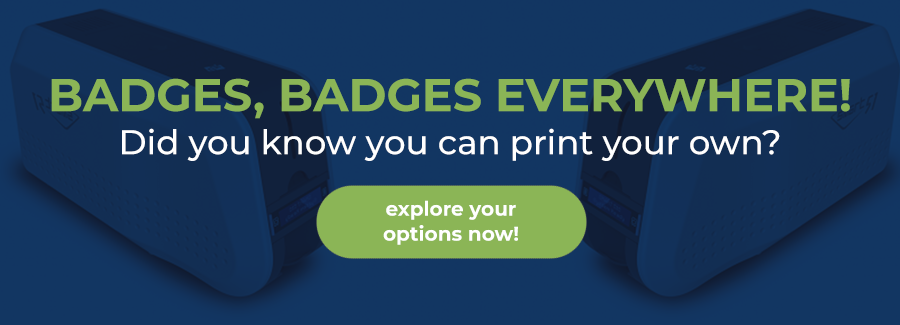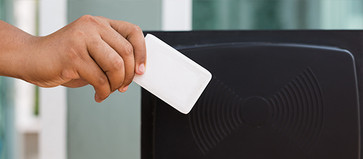Get Smart with RFID Card Printers
When radio frequency identification ( RFID) technology was introduced in World War II, the British relied on it to identify “friendly” airplanes. These days, it plays a much different role but it still remains a reliable and trusted form of identification. Knowing more about RFID cards, how they work and why they’re beneficial to a business can help you decide if they are the right choice for your company. Then, if you’re going to use them, you can also determine if you’re better off printing your own RFID cards or outsourcing the project.
When used in identification cards, RFID technology can provide multiple benefits to a company. These smart cards, also known as proximity or prox cards, can open specific doors and keep track of where people are in a building. One of the reasons they’ve gained popularity is because they provide useful information on employees and their whereabouts, adding to the security of a building and ensuring that access is only given where it’s appropriate. And, even better, RFID cards are programmable, easy for everyone to use and are extremely cost-effective.
How RFID Cards Work
RFID cards are embedded with a chip that has data specific to the holder of the card. That chip can only be read by designated equipment, which helps safeguard the security of the information. That means that even if a card is lost, it very rarely will provide someone from outside your organization with information they can use.
Each time the card is used, the computer equipment will identify the card holder and record the action in a database, making note of the date and time, as well as indicating what door was opened. Then, if a security breach occurs or vital information goes missing, a security team can access the database to find out which individuals were in a room or area at the time of the event. RFID cards are also helpful in the case of an emergency, as security teams can use card data to find out if people are still in the building and, if so, can locate where they are.
Unlike cards that use barcodes and must be scanned in, or a card with a magnetic stripe that needs to be swiped, RFID cards only require that the user gets the card close enough to a reader for it to pick up the signal. Since the technology uses wireless communication, the card can be read through a pocket or if clipped to a shirt rather than having to make direct contact with the reading machine.
Advantages of RFID Cards
In addition to being secure and easy to use, RFID cards are designed for durability. Although the cost of an RFID card reader is comparable to the scanners used for barcodes or magnetic swipe cards, the equipment is likely to last longer because it doesn’t have as much physical friction as readers that require contact. That makes it a good investment for someone who is considering adding an extra security measure for their building.
RFID cards also provide an extra measure of personal safety, particularly in healthcare environments or facilities with a large number of people passing through the doors, such as a factory or government facility. Since systems such as those offered by ADP and KRONOS allow employees to clock in without touching a keypad, they won't be a landing place (or launching pad) for germs. It also allows them to get in more quickly than using a traditional timeclock.
And, when an employee leaves or the type of access they’re allowed changes, the cards are easily reprogrammed — as long as you have the right equipment. Or, if your company changes the equipment used to read the cards, you can reprogram the cards with new data instead of having to issue new cards.
Should You Print Your Own RFID Cards?
Because of the many technological advancements in card printing, you can find a sophisticated printer at an affordable price that will handle your company’s ID cards. There are several factors to consider when choosing whether to print your own cards or outsource the job, including whether there is an ongoing need for badges vs. a one-time printing job, what type of security features you need and if you have adequate staff to take on the task of printing the cards.
If you determine that printing cards on-site is manageable for your company, you’ll discover that you have a number of options for card printers.
RFID printers have an encoder inside that uses radio frequency transmission to write the data specific to each card. In addition to writing that information, it can print other graphic elements — like text, photos, logos, etc. — as you’ll see on a regular printer.
Deciding which printer is right for you will often depend on the number of cards you’ll be printing; if you are going to print a large volume of cards, it’s important to get a durable, high-speed model that will be able to manage it. Talk with your printing professional to review your needs and determine which model would best work with your usage. Also, remember that when you get an RFID printer, it can also be used as a general label printer, so factor other uses into your buying decision.
Security Is in the Cards
In addition to buying the right ID card printer, you’ll find that there are many different cards to choose from. Before ordering, you will need to know which card format works for your reader and for your facility or site code. Common formats are 26 bit, 35 bit and 37 bit; in most cases, prox card readers will operate on 125Hz technology. However, if you have questions about whether or not a card will work with your existing readers, we can provide you with a sample card to test and make sure it is compatible. Our cards are compatible with a number of different brands, including HID, Honeywell, Farpointe and Kantech.
You might also want to consider providing employees with RFID shielded card holders, which can help improve the security of their cards.
If you have questions about which cards are right for you, what printer will best work for your company’s needs and whether a card will be compatible with your facility’s brand of card reader, we can help. Call us at (844) 443-7467 to discuss your RFID card needs.



